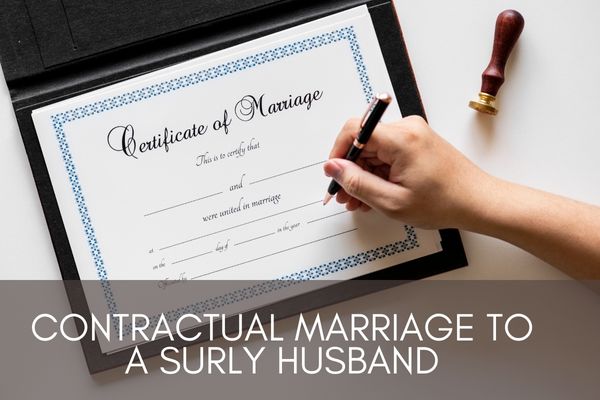A Contractual Marriage to a Surly Husband can be complicated; navigating such a marriage could prove difficult.
Veterinarians should understand the problems with marriage contracts as they currently exist. The choice to sign such a contract is undoubtedly highly individual and affected by your circumstances and values.
A marriage contract is one of several legal instruments to meet your particular needs. This essay is not meant to be a substitute for legal counsel, which must always be based on the particulars of each situation.
Contractual Marriage to a Surly Husband
Contractual marriage, also known as a marriage of convenience, is a type of union in which the terms and conditions of the wedding are agreed upon and written down in a legal contract. This type of marriage is often entered into for practical reasons, such as financial gain, immigration, or social status. However, when one of the parties in the marriage is described as a “surly husband,” the situation becomes much more complicated.
A marriage contract is a written agreement between two individuals who intend to wed. Marriage contracts are frequently used to specify which partner will hold onto property and other assets in the event of a divorce. But this isn’t always the case. Some marriage contracts also state the terms of the marriage and the commitment the spouses make to one another. Sometimes these agreements even specify how premarital children would be cared for if the marriage dissolves.
Sometimes, the conditions of how financial matters would be handled in a divorce are not included in marriage contracts. Religious marriage agreements frequently include commitment clauses. For instance, a husband often agrees to work and support his wife in a Jewish ketubah, the marriage contract. This arrangement frequently requires him to respect her as well. Unlike a prenuptial agreement, a man’s moral and religious commitment to his wife and the financial burden is often disclosed in this marriage contract.
Who Is A Surly Husband?
A grumpy husband is typically defined as a man who is unfriendly, bad-tempered, and challenging to get along with. This behavior can make the union difficult and unhappy for both parties in a contractual marriage. It is essential to consider both parties’ emotional and mental well-being before entering a contractual marriage, especially if one has a surly disposition.

Is Contractual Marriage Legal?
The term “contractual marriage” refers to a partnership in which the terms and conditions of the marriage are agreed upon and recorded in a FORMAL contract, also referred to as a “marriage of convenience.”
A contractual marriage may be entered into for practical reasons, but it is still a legal commitment and must be treated as such. This is a crucial point to remember. Each party has rights and obligations within the marriage, and it’s critical to comprehend and respect them.
Is Contractual Marriage An Ideal Marriage?
Prenuptial agreements and marriage contracts have the air of being exclusively used by rich or famous people. Although these agreements are often associated with riches, they can also be advantageous for regular folks.
Marriage contracts are voluntary agreements a couple enters into before or after their union. These arrangements specify what will happen if the marriage does not work out.
You can receive a marriage contract if you’re a part of a couple already wed and want one. These agreements, known as “postnups,” are a little more complicated than prenups. Prenuptial agreements are contracts created before a couple marries, and individuals planning a nuptial may seek the help of a prenup lawyer in creating this sort of marriage contract. Because there is less leverage and more shared assets, postnups are more complicated, but they are still possible as long as the couple can agree on the terms of the arrangement.
Sometimes, a contractual marriage may be entered to escape a difficult or dangerous situation. For example, a woman may conveniently marry a grumpy husband to gain citizenship in a new country. However, even in these situations, it is crucial to consider the potential consequences of the marriage, including the emotional and mental toll it may take on both parties.
It is also important to note that while a contractual marriage may be entered into for practical reasons, it is still a legal commitment and should be treated as such. Both parties have rights and responsibilities within the marriage, and it is essential to understand and respect those rights and responsibilities.

The Good Side Of Contractual Marriage
Marriage contracts may give the impression that the couple does not trust one another, but that is not the case. Prenuptial agreements are a realistic way to handle money issues in a marriage, and they can help the union stay on course.
Prenuptial agreements no longer appear to be as stigmatized as they once were. People may be more motivated to defend their interests before getting married if they witness the challenges associated with their parent’s divorce.
A prenuptial agreement can still be advantageous if you are not affluent. Prenuptial agreements, for instance, are a wise choice if a couple wants to clarify what will happen to their assets in the event of a divorce.
The marriage contract provides the certainty and peace of mind that comes from knowing how property will be divided in the event of a breakup or death of a spouse.
The Bad Side Of Contract Marriage.
The idea of a legally binding union is frequently presented as primarily focused on our happiness and contentment. Marriage is appreciated as long as our needs are satisfied. But when our partner can no longer meet our demands, we are made to feel as though withdrawing or leaving is acceptable.
On the surface, this marriage seems to be working out well. As long as you both consider one another’s needs and seek to fulfill them, your union will be generally stable and tranquil. Of course, in reality, things rarely operate this way. No one is a perfect partner, nor is our husband or wife an ideal provider for our needs. Because of this, a marriage built on the “I-will-if-you” principle will inevitably lead to tension.
As soon as your partner disappoints you, you’ll find yourself keeping a mental scoreboard and feeling justified in withholding something from them. And you’ll use how you’ve addressed your spouse’s needs as leverage when you negotiate for what you want, forcing them to repay the favor. Conflict also becomes terrifying because you start to worry that your partner may leave you if you disappoint or let them down; after all, if you didn’t keep your end of the bargain, why should they?
How To Deal With A Surly Husband In A Contractual Marriage
First, any partnership has to have open lines of communication. Create a space where you and your partner feel comfortable talking about anything and everything related to your relationship, including your patterns of anger, any cruel words spoken, and any other undesirable conduct. You can solve several issues when you communicate.
Understanding your husband’s character, nature, responses to your actions, and dislikes is essential if you want to know how to manage them. Understanding the other person is more important than trying to control them. You will learn how to respond to situations better and lovingly and maintain calm and harmony between the two of you when you consciously try to comprehend them.
An aggressive partner will be confident when addressing two or more opposing viewpoints. This does not imply that you scream and struggle to get out of something. This will significantly exaggerate the problem. When you behave assertively, you adopt a stance from which you may express your needs while being considerate of your partner’s needs and feelings.
Additionally, being firm and respectful demonstrates openness, honesty, and confidence. You simultaneously give your partner the freedom to assume their fair share of responsibilities.
Also, when dealing with a cranky partner, you must maintain your composure and refrain from exchanging blows. An angry partner will become more defensive and uncooperative if you confront or argue with them.
It’s not a good idea for the other partner to react when one spouse is disrespectful, impolite, or angry. When the person has calmed down, you can talk honestly with them. Perhaps their fury will diminish more quickly the more composed you are.
Unfortunately, things could not turn out even after you’ve given more than your all. It’s not the proper relationship for you if, despite your best efforts, your partner’s rage, rudeness, or contempt continues. You shouldn’t have to put up with their bad behavior if they don’t realize how it affects your marriage. It can be wise to distance yourself from things you can’t change now.
In Conclusion
A contractual marriage can be a practical solution for specific situations. Still, it is essential to consider both parties’ emotional and mental well-being, especially if one is a grumpy husband. It is also important to remember that a contractual marriage is still a legal commitment and should be treated as such. If the marriage becomes unbearable, the couple should seek professional help or consider divorce.








